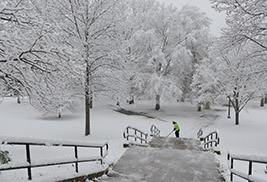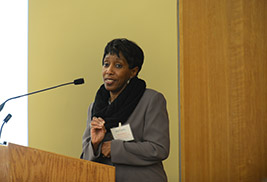Featured Article
Kent State’s Alfreda Brown Honored With Diversity Visionary Award
Alfreda Brown, Ed.D., Kent State University’s vice president for diversity, equity and inclusion, has been selected to receive a Diversity Visionary Award from INSIGHT Into Diversity magazine, the oldest and largest diversity-focused publication in higher education.
read more2014-2015 Winter Weather Advisory Information
Posted Nov. 24, 2014
Pictured is Kent State University's Front Campus covered
in snow.
Northeast Ohio has enjoyed a beautiful fall season, with many warm and sunny days. But as all of us know, winter has already arrived. One of our responsibilities as senior vice presidents for the university is determining cancellations and closures on the Kent Campus during severe weather conditions.
Generally speaking, the university does not close or cancel classes because of cold weather, winter ice and/or snow conditions. However, there are those rare occasions when weather conditions may delay or cancel classes, or close the Kent Campus.
That decision is made after consulting with the Department of Public Safety (which is in constant contact with the Ohio State Highway Patrol, local police departments and the National Weather Service) and Facilities Planning and Operations (which is responsible for keeping campus sidewalks and parking lots cleared). The general policy and priorities used in guiding such decisions are as follows:
Delays, Cancellations or Closings
In order for us to make a decision to delay the start of classes or cancel classes, we have to anticipate where the severe weather is heading. That decision is based upon the best knowledge we have at the time for what the conditions will be like. Sometimes a delay is appropriate in order to gain two to four hours to get the campuses ready for vehicular and pedestrian traffic. There can be a wide range of weather conditions in the outlying areas, and although we take into account our many commuter students, the decision is based on the weather and forecasts in the Kent area.
When extreme weather conditions exist in the Kent area, every attempt will be made to determine a delay or cancellation of classes, a delayed opening of the Kent Campus, or a campus closure before 6 a.m. for morning and all-day cancellations, 10 a.m. for afternoon classes and 3 p.m. for evening classes. Below are key points to keep in mind:
- In the event of a delayed opening of the Kent Campus, classes will not begin before 10 a.m., unless otherwise noted. Students in special classes, i.e., clinicals, should consult with their dean on the appropriate procedures for an early morning delay or cancellation.
- When there is a delayed opening of the Kent Campus, employees shall report to work when the delay has been lifted, with the exception of those staff members who are deemed essential and must report. If you are not sure of your status, please check with your supervisor.
- When classes are canceled, university services and offices remain open. This means that staff members are expected to report to work as usual, or remain at work if the cancellation occurs during the day. If there is an exception to this, it will be communicated with the class cancellation announcement.
- Our university staff members work very hard to keep campus sidewalks, roads and parking lots clear. Only when the university is “closed” due to weather are offices closed and some services not available. Even in that situation, essential staff members must report to work so that operations needing 24-hour attention are maintained.
The above information pertains to the Kent Campus. Each campus’ respective dean determines Regional Campus delays, cancellations or closings. When such decisions are made, the advisory information will be communicated via the same vehicles as those used by the Kent Campus. Please remember that our campuses occupy a region the size of Connecticut. When Ashtabula closes, there may be no reason to close Tuscarawas, or vice versa.
Safety Is the Top Priority
Everyone’s safety is a priority, and good judgment should be exercised during severe weather conditions. At times, there has been confusion when the Governor’s Office issues a closing order, or when the local sheriffs’ departments have posted snow emergency advisories.
A closing order from the Governor’s Office is issued primarily for state office buildings and other state employees in the field. Colleges and universities do not fall into this category. Sheriffs’ departments issue snow emergency levels ranging from one to three. These orders do not apply to employees required to provide essential functions at their workplace.
Still, students, supervisors and employees are expected to exercise good judgment during severe weather conditions. Travel conditions may cause an employee to arrive to work late, be absent or leave work early. Employees should notify their supervisors if they are unable to report to work or feel it necessary to leave early.
Communications
There are three ways to learn about any delays, class cancellations or campus closings:
- Flash ALERTS message and FlashLine email. The Flash ALERTS message will notify subscribers to check the university’s Advisory Web page for up-to-the-minute reports on campus and class status. You can subscribe to Flash ALERTS at www.kent.edu/flashalerts.
- Kent State’s Advisory Web page at www.kent.edu/advisory. This page lists any closings across the university’s eight-campus system. A red bar will appear on the top of the www.kent.edu home page if there is a cancellation or closing. The information is also posted to the university’s Facebook page and Twitter.
- Television and radio broadcasts. For a complete listing of all of the television and radio stations to which Kent Campus cancellation information is reported, please visit this guide.
If you use Flash ALERTS or Twitter to get your information, we encourage you to also check the Kent State Advisory Web page or your kent.edu email. The text alerts and Twitter feeds are limited in the amount of information that can be displayed, while the advisory page and email will list all details of a delay, cancellation or closing. This is especially important for staff, so they know whether or not they are to report to work.
Be safe if you’re traveling during the upcoming holiday season, and let’s all hope for a mild Ohio winter!
Sincerely,
Todd A. Diacon
Senior Vice President for Academic Affairs and Provost
Gregg S. Floyd
Senior Vice President for Finance and Administration
